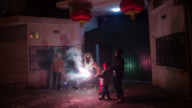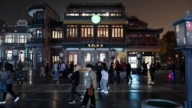【新唐人2013年10月02日訊】10月1號是中共竊國64週年,中共喉舌刊發社論,9次提到所謂的「夢」和「夢想」,中共總理李克強也提到,要實現所謂的中華民族偉大復興的「中國夢」。評論指出,共產黨的夢想和老百姓的夢想背道而馳,現在百姓對黨的迷信崇拜已經徹底破滅,中共只能打出民族、國家夢,來忽悠老百姓。
9月30號,《人民日報》刊發:《為現代中國凝聚夢想力量》的社論,宣稱中國人離所謂的民族復興夢想,從未像今天這樣接近。在這篇共計8段的社評中,竟然出現了9次所謂的「夢」和「夢想」。網友嘲諷:中共做的是「青天白日夢」。
原《河北人民廣播電臺》編輯朱欣欣認為,中共以「復興民族的夢想」作為包裝,藉此綁架、欺騙國民跟著它走。
原《河北人民廣播電臺》編輯朱欣欣:「中共現在來講,已經從過去(對)毛澤東的領袖個人的崇拜,到共產黨的崇拜迷信,已經徹底破產了,到現在只能打出民族國家所謂的夢想,靠這個來忽悠老百姓。」
9月30號晚,中共國務院舉辦的「十.一」活動上,李克強在講話中也提到:為實現所謂的中華民族偉大復興的「中國夢」而不懈奮鬥。
朱欣欣:「中共長期以來,它的所做所為讓老百姓看到了,它根本就不能代表一個民族或國家的理想,也不能代表每個人的個人幸福的夢想,它完全就是為它一黨的統治、一黨專政,少數的特權階層為它們特權的理想存在。」
中共總書記習近平上任後,提出所謂「中華民族偉大復興」的一個構想。今年3月的人大閉幕會上,習近平在講話中9次提到「中國夢」。
黨媒社論聲稱,中國社會各方面,現在都激發出實現夢想的信心與力量。但是,旅美原大陸史學家劉因全指出,中共最近大肆打壓網路自由、鎮壓維權和信仰人士,在這種情況下提民族夢想,沒有人會相信。
旅美原大陸史學家劉因全:「它們已經可以說是黔驢技窮了,走到了絕路,沒有甚麼可提的了,改革開放它們也不敢說,政治體制改革也不敢說,它們骨子裡還想恢復倒退向左轉,恢復到毛澤東那個時代去,但是它們也不敢說出口來,只能用這種夢來忽悠人。」
數週以來,中共大肆抓捕網路批評人士。《德國之聲》說,共產黨認為自己的言論控制權受到了威脅,知名博主有的被捕、有的被迫在電視上出醜。一場「網路文革」就要逼近了嗎?
而9月10號,中共「兩高」出臺新的司法解釋,指所謂編造恐怖信息者,沒有傳播行為也可以定罪﹔民眾發出所謂「開玩笑」的網貼,也可能要承擔法律責任。
朱欣欣:「老百姓從切身的體會和真實的生活能夠看到,只要中共存在一天,中國的夢想,老百姓的夢想,就會一步步的更加的遙遠,共產黨的夢想和老百姓的夢想是背道而馳,它都是為了一黨專制的,維持它的所謂的紅色江山,為它所服務的。」
今年元旦,廣東《南方週末》刊發弘揚「中國夢」的社論,結果如同做了一場「噩夢」,成為轟動一時的「南周事件」,這篇社論最後改為了「家國夢」。
朱欣欣:「今天這個國觴日,作為一個普通的國民,應當好好的反思中共建政以來的歷史,應當徹底的和中共進行決裂,不要被它的宣傳所迷惑,要看清這個大的趨勢,沒有自由,沒有民主,沒有憲政,中國夢是不可能實現的。」
中國的網路世界發出了人民的心聲,網民自創的「中國夢」,道出了中國人民真正的夢想所在。
「中國夢不是獨裁的夢,中國夢不是專政的夢,中國夢不是『屏蔽』的夢,中國夢不是貪官的夢。中國夢是人民的夢,中國夢是民主的夢,中國夢是憲政的夢,中國夢是民富的夢。」
採訪編輯/李韻 後製/陳建銘
The Chinese Regime’s China Dream
October 1 is the 64th anniversary of the Chinese Communist
Party’s (CCP) establishment of the Peoples Republic of China.
In an editorial from a CCP media outlet, “the dream"
was mentioned nine times.
Chinese Premier Li Keqiang also mentioned achieving
the great rejuvenation of the China dream.
The editorial said that the CCP’s dream is totally opposite
from that of the Chinese people.
Now, the public’s illusion towards the CCP has disappeared,
so it can only play on the national dream to fool people.
On September 30, People’s Daily published its editorial
entitled, “To Dream of Modern Chinese Cohesion Forces,"
which stated that Chinese people have never been so close
to a dream of national revival.
The word “dream" appeared nine times in the editorial.
Some netizens said what the CCP has is nothing
but a daydream.
Zhu Xinxin, former editor of Hebei People’s Radio, believes
that revival of the nation’s dream is only the packaging
for the CCP to mislead people.
Hu Xinxin: “As far as the CCP is concerned, it has realized
the public has given up their cult-like worship of Mao
and their devotion to the Party, so they can only rely on
the national dream to deceive people."
On September 30, Li Keqiang mentioned, during activities
organized by the State council, to achieve the great
rejuvenation of the China dream with persistence.
Zhou Xinxin: “Under the CCP rule, Chinese people are
very clear that what the CCP has done can neither represent
the ideal of a nation or a state, nor the dream of the people.
What the CCP has done is entirely for a one-party rule,
one-party dictatorship, and the privileged existence of a few people."
Since Xi Jinping took office, he brought forth his vision
of the so-called great rejuvenation of the Chinese nation.
In March 2013, Xi mentioned his China dream nine times
at the closing of the National People’s Congress.
The CCP’s media editorials claimed that currently, all aspects
of China’s society is showing inspired confidence
and power regarding fulfilling the China dream.
However, Liu Yinquan, US-based historian, pointed out
that recently the CCP wantonly suppressed Internet freedom,
human rights activists and religious groups, so no one
believes it when it mentions the national dream.
Liu Yinqiuan:" They are at the end of the rope.
It’s a dead end and no way out.
They mention neither reform and opening nor political
reform.
Deep down inside, they wanted to go backwards
to the Mao era, but they are afraid to utter it.
Thus, they can only take a China dream to mislead people."
In recent weeks, many Internet critics were arrested.
Deutsche Welle said that the CCP considered these people
a threat to its power to control speech.
Many well-known bloggers were forced to show their faces
on television.
Is the Internet Cultural Revolution coming near?
On September 10, the CCP announced new judicial
interpretation, in which people who spread fabricated information
can also be convicted.
When people publicize their jokes online, they are also
liable for their postings.
Zhu Xinxin: “People can see, from their personal experiences,
as long as the CCP exists, China’s dream
and the people’s dream will move further apart.
The CCP’s dream is entirely different from that
of the Chinese people.
The CCP’s dream serves as a means to maintain
its one-party dictatorship."
On the Eve of 2013, Guangdong’s Southern Daily published
its editorial to promote the China dream,
which turned into a nightmare.
In the end, the editorial had to change its title to,
“Home Country Dream."
Zhu Xinxin: “Today is a national holiday
for the establishment of our country.
As ordinary citizens, we should properly reflect the history
of the CCP and break away from it.
We will not be fooled by its publicity, but we should look
at the trend.
Without freedom, democracy, and constitution,
the China dream will be impossible to achieve."
Netizens in Mainland China have created their own
China Dream on the Internet, expressing the voice
of the people and pointing out where the Chinese people’s
dream truly lies.
China dream is not a dictator’s dream, not a one-party dream,
not a covering up dream, and not a corrupt official’s dream.
China dream is the people’s dream, a democratic dream,
a constitutional dream, and a making-ordinary-citizens-rich dream.




























